#kolinahr master
Text
Personnel File (Reactivated) J'tk S'zhr T'Wan
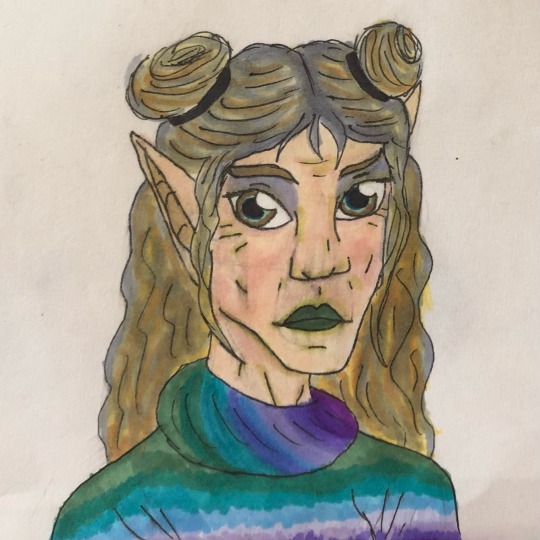
Position: Civilian Xenoanthropology Counselor, Bartender at Hearth's Call Replimat aboard U.S.S. Tubman
Rank: Former Commander, Specialist/Counselor
Species: Vulcan
Gender: Female
Date of Birth: 2187
Age: 193
Place of Birth: Ta'Vaish, T'Khasi (Vulcan)
Height: 1.65 meters
Weight: 56 kilograms
Eye Color: Green
Hair Color: Greying Blonde
Family: *J'tk T'zai Evaris (grandson, biological)
*Civilian is Kolinahru and no longer maintains social or familial ties, relative only listed in relevance to her current stationing.
Education: Vulcan Science Academy (Class of 2213), Starfleet Academy (Class of 2220), The Kolinahru Monastery (Completed 2319, departed 2378)
Service Record: Starbase 1383, Ensign, Researcher (2224), U.S.S. King Jr., Lieutenant Jr. Grade, Consultant (2230), U.S.S. Kelvin, Lieutenant, Head of Social Sciences (2238), U.S.S. Horizon, Lieutenant Commander, Science Officer (2246), Vulcan Lunar Colony 7 (2301), U.S.S. Curie, Commander, Science Officer (2310)
Background Story: Although the civilian is formerly a Starfleet officer, she is the only active duty individual in any Starfleet capacity, former, diplomatic or otherwise, that is regarded (with some philosophical conflict) to be a Kolinahr Master. She became a civilian counselor upon special request by Starfleet, but expressly by choice. Not for the sake of the connections of her former life or familial ties, but as a challenge to her mastery. She considers the decision highly logical. She has always found how rituals around food and beverages that temporarily alter mental states a topic of intellectual curiosity, and thus has volunteered her services in the Replimat when she is not needed as xenoanthropological consultation.
Personality Profile: She is of the reasoning that one cannot truly be considered a "master" of anything if they can only maintain their mastery in an environmental and sociological vacuum. That if to be Kolinahru is to no longer make the distinction between the self and the universe, one must not object to changing the patterns of their life. If to be Kolinahru is to fully embrace the teachings of the Kir'Shara, she must move with the Threads of Kaiidith, Growth, and Service as logic and life indicate them to her.
Physical Profile: Vulcans of this civilian's advanced age are a bit of a rarity on active duty starships, let alone as members of ship's crew compliment. Dark blonde hair fading to grey, and light green eyes and general resemblance to her biological descendant who serves aboard the Tubman. Chooses to use makeup and hair stylings of 23rd century Vulcan fashion, logically claimed as means to an end in provoking curiosity in the ship's replimat.
Special Notes: Caution, Civilian's biological descendant is of a clandestinely volatile nature, known in private records to be one quarter Romulan. Civilian invited to be partially recommissioned with the intent on gaining further insight to the officer's heritage as well as for potentially Lt. Cmdr. Evaris and her own safety, including the sanctity and seclusion of the monastery she formerly resided in.
#star trek#star trek ocs#ocs#oc#original character#vulcan#vulcans#kolinahr#kolinahru#kolinahr master#j'tk s'zhr t'wan#dr t'wan#t'wan#counselor t'wan#kolinahru t'wan#master t'wan#the tubman#the uss tubman#uss tubman#ichayalovesocs
6 notes
·
View notes
Text
Characterizing Tuvok as being lowkey self-conscious that he didn't complete the Kolinahr is honestly so funny and so canon to me now
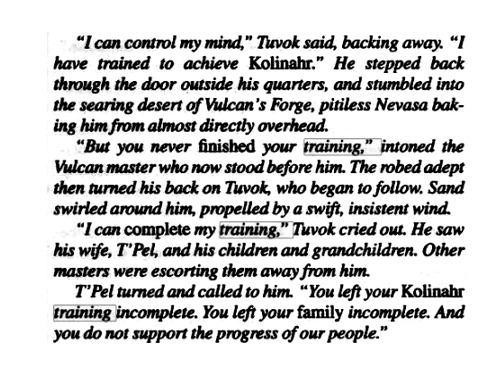
Transcript under cut!
"I can control my mind," Tuvok said, backing away. "I have trained to achieve Kolinahr." He stepped back through the door outside his quarters, and stumbled into the searing desert of Vulcan's Forge, pitiless Nevasa baking him from almost directly overhead.
"But you never finished your training," intoned the Vulcan master who now stood before him. The robed adept then turned his back on Tuvok, who began to follow. Sand swirled around him, propelled by a swift, insistent wind.
"I can complete my training," Tuvok cried out. He saw his wife, T'Pel, and his children and grand children. Other masters were escorting them away from him.
T'Pel turned and called to him. "You left your Kolinahr training incomplete. You left your family incomplete. And you do not support the progress of our people."
#Tuvok not completing his kolinahr training comes up several times in Tuvok's own mind and it makes me smile everytime#Tuvok: (dying of fever and maybe poison in a prison cell after an undercover mission gone wrong) Damn. AND I never achieved Kolinahr.#novel experiences#Tuvok#Tuvok nightmare in which T'Pel & Janeway collab on a callout post about him
21 notes
·
View notes
Text
💛💙SPIRK FIC REC💙💛
Ooo this TOS fic was soooo gooood!
Spock undertakes the Kolinahr at Gol and while there he is psychically and emotionally abused by a lecherous Vulcan Master who manipulates and takes advantage of his sexual thoughts about Jim. After a while he falls ill and becomes completely paralysed, trapped in his own body with no way to communicate except when melded with.
Kirk and his crew become aware of their friends plight and race against the clock to try and discover what happened and how they can cure Spock. There are some great links to previous TOS episodes woven throughout the story.
This fic also has one of my favourite ever original characters. Prepare to completely fall in love with Staff Priest Soram of the Shi’Kahr Hospital. 🥰🖖
#kolinahr#gol#star trek#spirk#spock#james t kirk#k/s#kirk/spock#k/s fanfic#fan fiction#fanfic#fan fic rec#star trek tos#tos kirk#tos spock#tos spirk
18 notes
·
View notes
Text
Tuvok develops a holographic training program for Vulcans who want to test the strength of their emotional suppression.
Neelix jets to Vulcan years later to say hi to his old friend and is very confused when masters of Kolinahr run from him screaming.
19 notes
·
View notes
Text
Vulcan headcanons: Kolinahr
Kolinahr is probably the only ‘vulcan discipline’ most people heard of, however what it actually involves is rarely well underatood.
The process of removing emotion is not achieved through their supression, but through complete acceptance of reality. It’s essence is well described by the passage from Surak’s Teachings:
Learn reason above all
Learn clear thought:
Learn to know what is
from what seems to be,
and what you wish to be.
This is the key to everything:
The truth of reality
The reality of truth
What is will set you free.
A person who achieved Kolinahr is still a living, sentient being, not an organic computer. While do not feel emotions, having achieved a state in which every thought and action is based on logic, they still have values they believe in, that become the main reason for taking action. Every decision is made by applying those values to a given situation. While those values may vary form person to person, those are generally included :
- preservation of life and dignity
- pursuit of truth and knowledge
- creating new things
While the list may seem short, it is possible to derive a lot from them on logic alone.
Eg.1
Life and dignity should be preserved
T’Lara is sick and cannot prepare her own food or leave her house;
T’Lara’s physical health will suffer if she doesn’t recieve sustainance and her mental health will suffer if she does not have contact with other people.
Decline in health can be hamfull to both one’s life and dignity.
Thus, to preserve life and dignity I will bring T’Lara food for the duration of her illness and keep her company.
The people generally refered to as Kolinahr Masters, that sit on the Cabinet or in sometimes in the Federation Council are adepts of the discipline advanced both in age and experience. Most of them, hovewer, resides in monasteries where they teach others. The wider term – kolinahru, refers to everyone who has achieved the discipline. The term adept can be used interchangably.
It is worth noting, that among the kolinahru, there is no strict ‘ranking system’ and the title ‘Master’ is ussually simply an indicator of the function one serves within the society – that of a teacher.
There is no set time it should take to acheve Kolinahr. Ussually, it takes anywhere between two to six years to attain the discipline, although there are exeptions on both ends.
There are three phases in the Kolinahr training, meant to give the person a range of tools and mechanisms to build upon and assistance when needed, nevertheless it is important to mention, that whether or not someone will be succesfull is in their hands only. There is no way to force someone into the discipline.
The progression goes: Aspirant – Novice – Initiate – Adept (kolinahru)
One becomes an Aspirant the moment they are admitted to the training by one of the Masters. (The ceremony is described at length in the Kir’Shara.)
Upon entering the monastery, an aspirant takes very few personal items including a symbolical ‘one change of clothing’ - the only thing that would be necesary should one decide to leave. Everything else is provided.
This phase consists mostly of physical work and extensive studies in logic. It is common to see Aspirants to Kolinahr swarming in the monastery gardens pruning plomeek or performing masonry work around the premises. It is meant to prepare them for the demanding regimen of both physical and mental training that awaits them later on as well as give them time to contemplate whether or not they wish to continue. Many resign at that point, and it is not seen as a shamefull thing.
Once an Aspirant is deemed ready by the Master(s) in charge of their training, they enter Noviciate.
That period within itself is separated into parts and highly ritualised, different stages indicated by changes in clothing, moving from one place in the monastery to another, etc.
Fokarikau-wek (Period of strenghtening)
A Novice moves from the group dormitory of Aspirants into a cell.
They begin a regimen of physical and mental exercises designed to distance from both physical and emotional stimuli. This time also includes periods of fasting generally not present during aspirancy.
There are two common types of physical exercise, one somewhat reminescent of Earth sport gimnastics with the use of bars and other such equipment and the other more reminescent of yoga. They serve both as a way of strenghtening the body and as a way of developing mental discipline.
Mental exercises range from building block structures within one’s mind while maintaining the laws of physics to listing all possible outcomes of a hypotethical situation, but generally tend to focus on developing the ability to think quickly and analitically and maintain focus for prolonged periods of time.
Sadalaya (release)
During this period, a person gradually works through their memories and emotions they have experienced in the past to achieve closure and acceptance necesary for achieving Kolinahr.
The primary mean is, of course, meditation, but the methods also include many activities that on Earth would be called ‘cathartic’, such as writing, creating art, music (there is an interesting text written by T’Prion regarding the use of music in ataining Kolinahr), and again, intense physical exercise.
During this period, it is expected that a person may experience strong fluctuations of their emotional state. Because of this, Novices are closely monitored at all times. They don’t carry any potentially dangerous objects on themselves. That results in a characteristic method of tying or braiding hair without the use of accesories (sadalaya-kal).
For the sake of limiting emotional transference, Novices at that stage live in the most isolated parts of a monastery.
Nenat-tala (most important values)
The core values from which all motivation will be derived once Kolinahr is achieved are established at this point.
A very important element is developing a strong sense of self, separate from emotions, one’s body, etc. Below an example of a meditation that might be utilised :
I am; I simply am.
I think, but I am not my thoughts. I am.
I believe, but I am not my beliefs. I am.
I feel, but I am not my feelings. I am.
Pain and joy are transient, I am enduring.
I do, but I am not my actions. I am.
I experience, but I am not my experience. I am.
I want, but I am not my desires. I am.
I have but I am not my possessions. I am.
My body is not me. I am.
I live, but I am not my life. I am.
I was and I will be, but now I am.
I am not that. I am my self.
I alone am. I simply am.
I am; I simply am.
(I have not written that I found it on Wikiversity. I think it captures the general idea.)
Once a Novice has succesfully worked through their momories and emotions, developed the ability to detach themselves from stimuli and established strong core values and sense of self, after a verivication through a mind meld they become an Initiate.
The initiation ritual generally lasts the equivalent of two Earth weeks. Before it takes place a person is supposed to ‘take leave’ of people they were close to such as family, friends, acquitances etc. so that the thought of them would not disturb the process.
It is expected that those meetings may be quite emotional, and it is generally accepted, as the point is acheving closure.
Once the Novice had ‘taken leave’ of everyone they wished to, the ritual can start.
First, they spend 48 hours in meditation in a dark room devoid of any distractions, so that they reflect on any emotions within them and make sure that their motivations are the correct ones.
When that period passes, the Master who oversaw their Noviciate brings them a bowl of saya, a herbal extract that lowers the inhibitions and makes telepathic contact easier. The Novice can freely express everything that they still need to. All that they say or show remains under complete confidentiality to which there are no exeptions.
After the effects of the saya wear off, the person bathes and recieves a new set of robes, now marking them as an Initiate. Sometimes this part involves cutting of shaving hair, but the custom varies between monasteries (also, Initiates that decide to move to a place with harsh climate would keep their hair for additional protection from the elements).
Once that is done, the Initiate mind melds with several Adepts who share their own experiences in attaining Kolinahr with them. That is the longest part of the ritual.
After that, the Initiate leaves (either into the caverns of Gol, Kel plains or some other isolated place depending on the circumstances) to continue their meditations, studies and gradually remove all remaining emotions from themselves. That period is called the Time of Truth.
Once they are succesfull, they return to their monastery so that their achievement may be verified by the Masters.
(Again, ceremony described at lenghts in Kir’Shara.)
When the ceremony is complete, an Adept returns to the society to serve whatever role they are suited for, be it a teacher, judge, gardener or a scribe.
Some Clans practice ritual ‘welcoming back’ of a person that left tu pursue Kolinahr. It is a valued thing and a source of (more or less) concealed pride for a Clan to have a kolinahru among them.
- The kolinahru see each other as equals, there is no real hierarchy among them and each tends to fill a role they are the best suited to.
- There is no differentiation between kolinahru from dirrerent monasteries, they are welcome to come and live in any of them. It is also a custom amont Vulcan people, that if a kolinahru asks for a place to sleep at night, they are ussually granted such. It also applies to other things. Sholuld a kolinahru come to a vulcan household and inform that they need a ladder, they would be ussually given a ladder (and more often than not it would be given back).
- There are cases of members of species other than Vulcan succesfully attaining Kolinahr. Once they did, they were not treated any differently than other kolinahru.
- It is a custom, that when a kolinahru passes through the marketplace, the merchants would give them food, drink and in some cases other items that they see fit. That sometimes results in stiuations like the ‘embroidery endeavour’. (When a merchant gave fifteen running meters of silk to Adept T’Rina, all Adepts of the small monastery near Ta’Raan spent three months embroidering a set of curtains to hang in the main hall.)
- While the kolinahru usually wear a certain type of robes, especially while in the monastery, it is just as common that they wear normal clothing suited to the circumstances, or if they are also a member of another organization, a uniform of that organization.
If you have any thoughts or ideas regarding kolinahr or Vulcans in gereral, please, share them.
Live Long and Prosper
#vulcan culture#vulcans#star trek headcanon#vulcan headcanons#vulcan#star trek#kolinahr#vulcan language
29 notes
·
View notes
Text
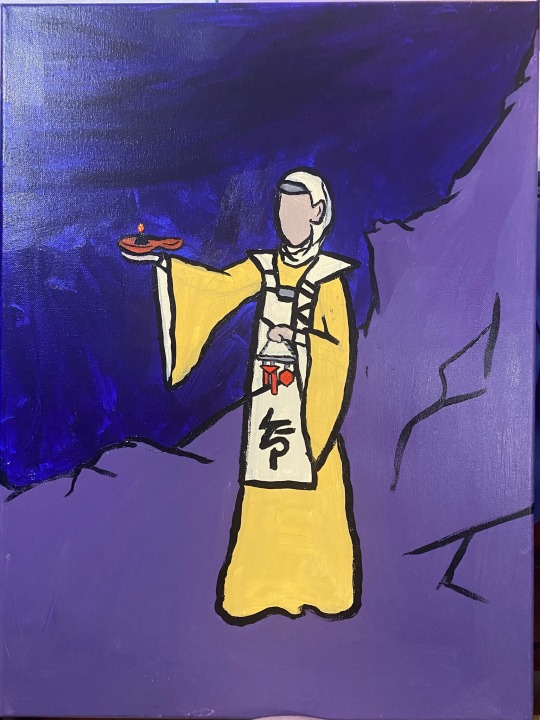
The kolinahr master from TMP as the hermit
7 notes
·
View notes
Note
Yeah, I remember when I was like you. Young, dumb, full of… conflicting emotions. //except for lambda it was like, yesterday lol
Rex just stared at Lambda while he went about his reflections.
"I wasn't aware you completed your Kolinahr. Truly, you have mastered and catalogued your feelings as per the Vulcan wisdoms, Mr. Spock."
A scoff.
"Look, Lambda. I am not in some kind of love-hate will-they-won't-they scenario. They just won't leave me alone! And it's been going on for so long I'm getting used to it, and I don't even want to. Aren't I allowed to feel weird about all this?"
1 note
·
View note
Text
lol i legit just created a class schedule for lwj and wwx because one of my least favorite things about fanfics & original fiction set at universities is not being able to figure out when they actually have class/do homework
#lwj has 1 less class bc he also has#1) a dissertation 2) a job 3) an?? internship??? he studies w a kolinahr master once a month#mdzs star trek au
1 note
·
View note
Text
Sybok thoughts.
Like a lot of things in original Trek, both the series and the movies, Sybok was a great idea that was poorly executed and made very little sense.
If you think about Sybok as a little boy, losing his mother, you can fully see why he rejected emotional suppression as a part of his spiritual path. She didn’t die. Rather she severed her connection to him completely when she became a Master of Kolinahr. She wasn’t his mother. She had suddenly never been his mother. It was as though Sarek had never been married to her to begin with.
Recently, I have been reading the Analects as explored in the fan fiction site Kir’Shara. Particularly this, from the Thread of Emotion:
“Where fear walks, anger is its companion. Behind them, hatred follows closely. Where does it end if not in violence? I say it must end with the understanding and discarding of the pach-te [...] it is what prevents the individual from joining the Oneness of the world. It is what sets the individual apart from the Other, the family, clan, community, nation, and all of Vulcan”
That is to say, what Surak taught was not that a Vulcan should never feel anything but rather that, like the Buddhist, a person who pursues Surak’s path must begin by tackling specifically fear and anger. But more than that, they should conquer the primordial selfishness which separates them from, among other things, their family.
In mastering Kolinahr, Sybok’s mother effectively missed the entire point of the whole of Vulcan spirituality, selfishly seeking honor, fleeing from emotion, separating herself from her family, in the same way that the pach-te separates the unenlightened Vulcan.
What if what makes Sybok “dangerous” isn’t that he embraces the pach-te, but that he teaches an alternate interpretation of Surak’s teachings that threatens the authority of the priesthood? What if he works harder than an ordinary Vulcan to conquer fear and anger, while embracing love and joy, seeing them as not incompatible with logic?
I want to imagine that he is banned from Vulcan, spends time with the Qowat Milat, studying psychology with Betazoids, and ultimately becoming a therapist, so that he can help others embrace candor, authenticity, logic, and happiness.
I want to see him join Star Fleet and reconcile with Spock.
336 notes
·
View notes
Text
S’chn T’gai Family Notes
• Sybok was born in 2224, according to the Star Trek Chronology (2nd ed.) and the Star Trek Encyclopedia (4th ed.; vol. 2).
• Michael Burnham was born in 2226, on Earth.
• Spock was born January 6, 2230, on Vulcan, in ShiKahr.
This makes Sybok 2 years older than Michael, and 6 years older than Spock. It also makes Michael 4 years older than Spock.
(Leonard McCoy was born in 2227, making him 3 years older than Spock, and 1 year younger than Michael. James Kirk wasn’t born until March 22, 2233, making him 3 years younger than Spock, and 6 years younger than McCoy.)
From the Inside Star Trek phonograph album, Spock was not the first vulcan/human hybrid, but he was the first to survive. Earth-Vulcan conception will abort during the end of the first month. The fetus is unable to continue life once it begins to develop its primary organs. Spock was removed from Amanda's body as his organs began development and placed in a test tube for two Earth months, as physicians performed delicate chemical engineering and introduced over a hundred subtle changes. After that, Spock was returned to Amanda's womb. At the ninth Earth month, Spock was again removed from Amanda, prematurely by Vulcan standards, and spent the following four months of a Vulcan term pregnancy in a specially designed incubator. This was the first time this particular procedure was attempted, and was entirely experimental. Baby Spock proved surprisingly resilient.
(Enterprise would later introduce the binary clone, Elizabeth, who would be the first vulcan/human hybrid, who passed away not long after her birth. Elizabeth was born 2155, 75 years before Spock was born.)
Michael’s biological parents, Mike and Gabrielle, were attacked by Klingons in 2236, after which point Michael was put in the care of her foster parents, Sarek and Amanda. Since Michael is shown spending her 10th birthday on Vulcan, this makes Michael 9 (going on 10 that year) upon being fostered. Spock would be 6, and Sybok would be 12. Sybok was raised by his mother until her death. Since we never see Sybok in the Discovery flashbacks, we can only assume Sybok was still living with his mother. We see Michael’s childhood up to age 11, so it can be assumed Sybok did not join the family until he was at least 13; while we still don’t see Sybok when Michael is 19, it can be assumed Sybok was either away for his own studies or already banished; banishment would explain why no one talks about him.
Sybok’s mother was originally described as a “Vulcan princess.” In the novelization of Star Trek V: The Final Frontier, she was given the name T’Rea, and referenced as a Vulcan priestess instead. In the book Sarek, she was referenced again by the name T’Rea, and given the title “reldai,” translated as an archaic vulcan term meaning both "female religious leader" and "female ruler or princess," in order to conflate both translations. “Priestess” appears to be the more correct term, as Vulcan does not appear to have a monarchy and she is described as being Sarek’s original childhood bondmate who annulled their bond in order to become a kolinahr adept, and later High Master. Sarek’s first “wife” is considered to (presumably) be Amanda, as she is said to be from Earth, so it would appear Sarek and T’Rea were never fully married, as Spock and T’Pring were never fully married.
The novelization also explains that Sybok was banished from Vulcan for violating the mind of a Watcher in the Hall of Ancient Thought in order to locate the receptacle of his mother's katra and meld with it to discover the location of Sha Ka Ree, which T’Rea had raised Sybok to believe in.
• Soon after arriving on Vulcan, Logic Extremists (a small Vulcan extremists group claiming to represent "true Vulcan ideology" and valuing logic above all, who regarded humans to be inferior and more heavily opposed human involvement in Vulcan culture than the average vulcan, who saw the extremists as fanatics) bombed the Vulcan Learning Center. This resulted in Michael Burnham dying for three minutes, before being revived by Sarek melding with her and leaving part of his katra inside her mind. Michael believed she, a human child living and learning among vulcans, was the target, however, Spock believes he was most likely the intended target, as the “half human abomination” in the household. It is likely that Spock is correct, as it seems Amanda, also fully human, was not targeted.
( If the vulcan extremists’ intended target was Spock, then a comparison (or even loose connection) might be made to Terra Prime, the extremist xenophobic terrorist organization dedicated to the expulsion of all non-Humans from Earth and the Sol system, who used vulcan/human hybridization as a fear tactic in Enterprise. )
Fearing for her adoptive family’s lives, Michael tries to run away from home, when she is initially stopped by a very young Spock, who pleads with her to stay. In her fear for their safety, Michael pushes Spock away by calling him a freak and a “weird little half breed,” and telling him he’s not capable of love. This moment causes a rift between the previously close siblings, leading Spock to choose to close himself off and fully commit to logic at a very young age. Michael tries to repair their relationship, but Spock is unreceptive until adulthood. Michael and Spock can only be about 10 and 6 respectively when this fight occurs.
• Spock is dyslexic, which is called L'tak Terai on vulcan.
• Spock is espoused to T’Pring at the age of 7. This is the same year he partakes in his kahs-wan.
The kahs-wan, or Vulcan maturity test, was a traditional survival test of adulthood for adolescent Vulcans. The basis for the kahs-wan was to survive ten days without food, water, or weapons in Vulcan's Forge.
In the animated series, Spock decided to take the kahs-wan early. His pet sehlat, I-Chaya, insisted on accompanying him, despite young Spock's orders. I-Chaya and Spock from the future end up having to save Spock from a le-matya attack, but I-Chaya had to be euthanized afterwards due to receiving a fatal wound from the le-matya’s poisonous claws.
• Solkar was the first Vulcan ambassador to Earth, and father of Skon. Skon is implied to be an ambassador (and would have been confirmed one if the fifth season of Enterprise was ever produced), translated the Teachings of Surak into English, and father of Sarek. Sarek is also an ambassador and is, of course, the father of Spock and Sybok.
• In the animated series, Spock goes back in time to save his younger self, and claims to be Sarek’s cousin by the name of Selek, son of T’Pel and Sasak. It is unclear if these are real relatives of Sarek’s, or if they’re fake and the S’chn T’gai family is so big Sarek can’t keep track of them all.
• Spock claims Arthur Conan Doyle is an ancestor of his. It can only be assumed this is on Amanda’s side.
416 notes
·
View notes
Text
I would love more AOS movies to be made. And series. With the same cast. I think, it has potential for exploring. In my opinion, Pine, Quinto and Urban understood their characters very well: their interaction on screen is a pleasure to watch. And for the character of Spock especially: Quinto shows his hidden love to Kirk so well. He is trying to be a good boyfriend to Uhura, and yet - there's always Jim, who's occupying all his thoughts, and Spock cannot do anything about it. Jim is a center of Spock's universe. This is how I see it in Beyond, (especially if considered how things ended in STID): he gets really exhausted (they both are - Jim as well had enough. And probably - Uhura as well by the looks of it) of that feeling of being torn between "the logical choice" of the partner that he feels "affection and respect" for and his true heart's desire, that he keeps deeply hidden (even from himself), and he just wants to get away from it all. But at the end he is unable to leave, as soon as he hears Jim's "What would I do without you, Spock!" And he's back. But back into the same situation. So, what'll happen next? Jim is also alone: no family, no partner. Only loyal Bones, who's like a brother. And Spock... who's, well... Spock. I cannot stop thinking about how depressed they both are on Jim's birthday party and how painful and longing are the looks that Spock casts on Jim, and his pain is almost palpable, when he looks at him (especially, when he knows, that Jim's not looking). How Spock follows Jim with his gaze, while having a drink with his girlfriend: like he is unable to avert his eyes from Jim. Uhura is by his side, smiling and chatting, but he is completely absent: his thoughts and his interest, quoting the great master of Kolinahr, T'Sai, from TMP, - "lie elsewhere". And there's an absolute despair in his eyes: dammit! It makes my heart bleed every time I see it! So, Abrams' thoughtless experiment ("let's give queer character a girlfriend, hahaha:) gave really painful results. To all of the characters. The fact, that they all love, respect and cherish each other (Uhura without a second thought sacrificing herself to save Jim's life, separating the saucer and staying herself with Krall, for ex. Others are the same. ) makes the situation even more painful and hopeless. Abrams really made a mess of it all.
And - yes: I would like to see, what happens next.
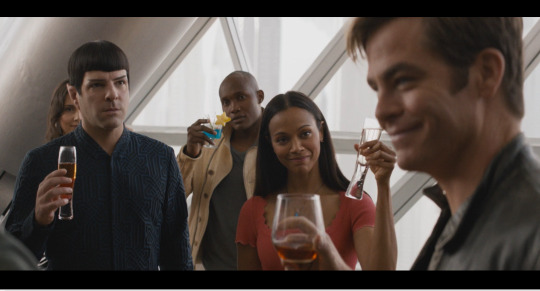
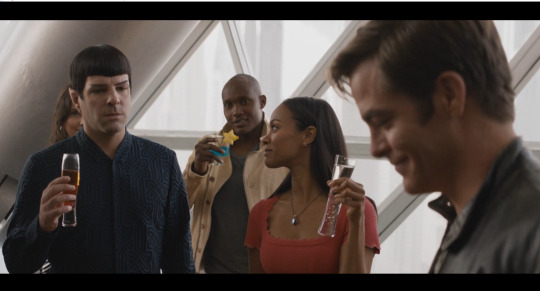
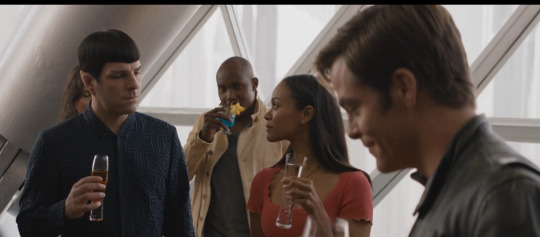
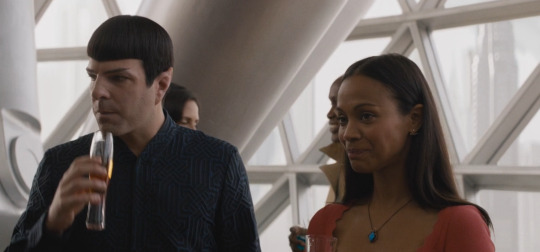
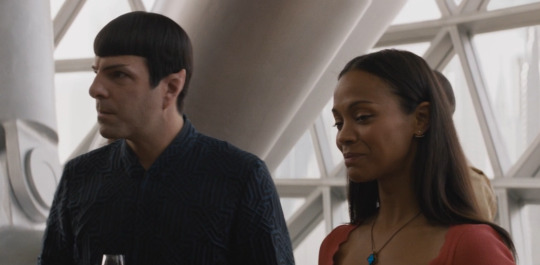
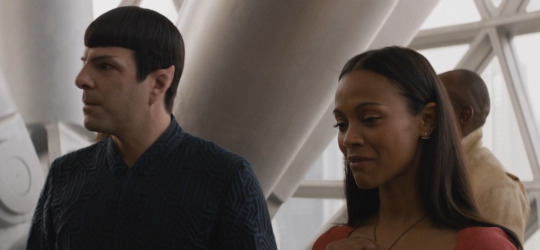

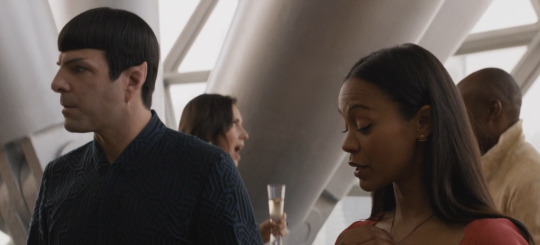
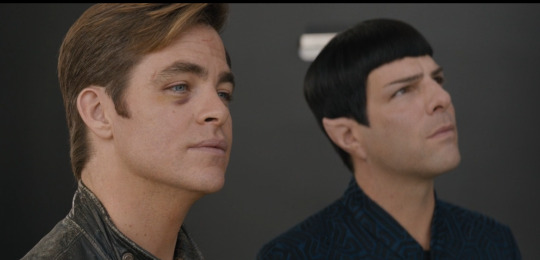
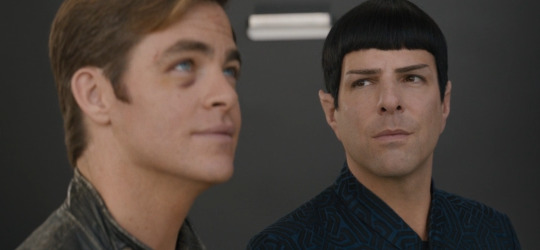
Yes, i know that Beyond was not directed by Abrams, but it is a sequel for the previous two movies and Spock being paired with Uhura was his idea all along, so he is the one responsible for this mess.
#spirk#k/s#kirk and spock#space husbands#kirk/spock#star trek#spock#kirk#james t kirk#st AOS#st beyond#kirk x spock#spock and kirk#t'hy'la#st spirk#aos#star trek beyond
182 notes
·
View notes
Text
as a mixed person... I have always been repulsed by narratives about spock/analyses of his behavior which paint him as someone ceaselessly divided between two cultures instead of a whole individual being pulled in different directions by the influences he’s been exposed to. framing his mindset as one with two separate and distinct halves oversimplifies his conflicts over how he should conduct himself (see: preparing himself for the kolinahr ritual for years (the original translation provided for the speech of the kolinahr master refers to ‘many seasons’) but neglecting to complete the final ritual at the last moment) and his conflict about expression regarding his interpretation of himself (which often involves an appraisal of himself as being overly revealing--for a vulcan--but through subtleties that only close friends (in this case bones) would notice--which is to say, behaving less overtly than a human). all is to say that spock, as we see him, is hardly the model of a vulcan. and while i maintain that he owes this distinction more to culture, the expectations within his personal relationships, and his contemplations of his place in society as a mixed person than to biological factors, there is something to be said about how individuals that are fully vulcan are raised, and what implications their instructions about composure, dedication to logic, and rejection of emotion have on their relationships with their spouses, children, and other loved ones...
which is why i am positively enamoured with tuvok.
tuvok and spock are not comparable, nor do i think there is much to be gained by drawing up similarities/dissimilarities between them and haphazardly chalking up their differences to distinguishments of humans/vulcans, with traits spock has alone being seen as implicitly and necessarily human and traits tuvok possesses that spock lacks demonstrating his being fully vulcan. (in fact, tuvok himself may not be considered by many vulcans to be an impeccable representation of their beliefs about personal behavior anyhow, and as a child even questioned the vulcan elevation of logic as the guiding force of life, saying in “Gravity” (5x03) “I refused to deny myself passion, the way you and men like my father do... If I was meant to deny feelings, why was I born with them? Where's the logic in that?”) but i digress... the benefit in having such wonderfully rich, well developed characters such as them is in being able to analyze the tenets of vulcan philosophies and teachings that they provide us with, not to determine to what extent they themselves consistently followed them. that said, tuvok being fully vulcan changes his reception in vulcan society. he did not experience the same pressure spock did to ‘prove himself’ as a vulcan to both his family as well as others who were hesitant to accept a half-vulcan child, and this allows tuvok to serve as one illustration of a full vulcan child whose abilities to control his emotions and act logically are never doubted (though his behavior is occasionally called in to question)
but as you contemplate the nature of vulcan behavior, their methods of understanding the world, and how they educate their children, one particularly interesting aspect of their culture which arises is the consistent demonstration of long term committed relationships (in this context--specifically familial or spousal/sexual) which are unemotional.
in tuvok, these unemotional relationships which demonstrate his vulcan upbringing most clearly are between himself and his children. based off of his interactions with the crew of voyager and the individuals they meet on their journey home, we learn about how vulcan relationships function, what vital elements take the place of love, and what the definition of love is by reduction rather than explanation: with the dedication, longing, and attachment to his family that tuvok speaks of and demonstrates not being considered aspects of an emotional love
excerpts from Star Trek: Voyager, “Elogium” (2x04)
TUVOK: ... I must point out that, as illogical as it seems, being a father can have infinite rewards. Far more than would seem possible. My children occupy a significant portion of my thoughts. Now more than ever.
NEELIX: I-I-I've heard it said that children can bring a lot of joy into one's life.
TUVOK: I experienced neither joy nor sorrow, but I do believe it is possible.
...
TUVOK: I have three sons and one daughter. I can assure you she benefits as much from my presence and guidance as my sons do. It is unfortunate that I must be so far removed from all of them now.
from this, it can be determined that: 1. tuvok thinks about his children. (this may seem obvious, but in actuality, it’s quite an... unproductive pursuit. stranded in the delta quadrant, years away from them, there is nothing to be gained from tuvok spending his time contemplating his children, and how they are faring so far away. if it is as he says to samantha wildman in “Once Upon a Time” (5x05), and he is confident in the wellness of his children given the company they are alongside, tuvok should be satisfied with his knowledge of their safety and accepting of his inability to change his position to be with them.
one of my personal favorite vulcan words is “kaiidth”, which translates approximately to ‘what is, is’ in federation standard. ("when one accepts what cannot be changed, one begins to think like a vulcan." - TOS novel: Dwellers in the Crucible). though i occasionally think this saying imparts too great a notion of passivity as a function of logic onto vulcans, i interpret this statement generally to be one which permits movement forward, but which does not erase wandering. in my mind, tuvok can both worry for his children (though such worry is illogical because he could not intervene in their lives to protect them if there were cause to worry) and he can resolutely and determinately perform his duties on voyager. perhaps isolating love and affection for his children (which he does feel, but does not experience regularly due to his repression of emotions and of their influence over him) from his worries about them allows for him to function adequately: grants him the ability to work as voyager’s security officer without encumberment from heartache and longing that the human members of the crew experience for the lives and people left behind in the alpha quadrant.
nonetheless, I persist in imagining thoughts of his children pervading tuvok’s mind even as he meditates. i imagine he wonders idly what they are doing at particular moments in time, what reflections asil has on the reading she’s been assigned at school, if sek searches through his memories of him as he navigates his own path as a father for the first time..)
this quote also demonstrates the position tuvok takes relative to his children, object 2 taken from this interaction being that some of the core values of vulcan parenting are presence, by tuvok explaining his regret that he cannot be with his family now and *guidance, by expressing his belief that his daughter would benefit from the wisdom and insight he could offer her were he present in her life (these two components existing in place of “mere” affectionate love).
*another note on guidance, an excerpt from a verse in “Falor’s Journey”, an epic story about a Vulcan merchant which tuvok’s youngest son would ask him to play for him on his lute, from Star Trek: Voyager, “Innocence” (2x22)
“He traveled through the windswept hills
And crossed the barren Fire Plains
To find the silent monks of Kir.
Still unfulfilled, he journeyed home
Told stories of the lessons learned
And gained true wisdom by the giving.”
it becomes clear in the lyrics of this verse that wisdom is prized on vulcan, and though information (such as that which was communicated to Falor in Kir) can be relayed, processed, and internalized, the richness of experience and interaction with others is what contributes to enlightenment. this forms the basis of tuvok’s relationship with his children, and as a father he is characterized by his wish to provide counsel and direction to his children. guidance, thus, can be seen as one of the hallmarks of vulcan relationships as a principle which takes the place of what humans might see as constituting love (things such as affection or fondness)
an excerpt from Star Trek: Voyager, “Innocence” (2x22)
“ELANI: If Vulcans don't feel anything, does that mean you don't love them?
TUVOK: My attachment to my children cannot be described as an emotion. They are part of my identity, and I am incomplete without them.
ELANI: I bet they miss you too.”
these lines constitute some of my absolute favorite bit of communication delivered in all of star trek. this single statement raises countless questions about the nature of vulcan relatedness and connection (some literature suggests that vulcans feel significantly deeper than humans do, with this increased intensity being the reason for the vulcan reformation and movement toward logic as the dictating factor for behavior in place of emotion. tuvok saying that his attachment to his children cannot be described as an emotion suggests that a labeled emotion is too simple a term for his relationship with them, yes, but does it also imply that there is a greater emotional bond that binds them so closely together and so fervently that it surpasses what can be considered an emotion? what could something like this be described as? how could it be represented?) this statement brings in a discussion about familial bondings, with tuvok possibly feeling incomplete without his children because of their telepathic link to one another: the constant feeling of their presence in his own mind forming a feeling of familiarity and self. finally, and most pressingly, this statement indicates tuvok’s self identification through another, his identity as a guardian, parent, and caretaker to his children contributing to his own notion of self
excerpt from Star Trek: Voyager, “Caretaker” (1x01)
JANEWAY: I spoke to your family before I left.
TUVOK: Are they well?
JANEWAY: Well, but worried about you.
TUVOK: That would not be an accurate perception, Captain. Vulcans do not worry.
JANEWAY: They miss you.
TUVOK: As I do them.
finally, tuvok identifies yearning as an integral component of vulcan relationships (though in my mind, I imagine this longing to be with his family as a less emotional appraisal of the term than may be expected... data’s explanation of friendship from Star Trek: The Next Generation, “Legacy” (4x06) “as I experience certain sensory input patterns, my mental pathways become accustomed to them. The inputs eventually are anticipated, and even missed when absent.” comes to mind...)
as I was talking about this with joe tonight, and wondering what possible motivation tuvok (and all other vulcans with similar familial connections like his) has to miss his family, to see himself as incomplete without them, and to worry about them if not for love, he said: “I read somewhere that when you mourn someone, you are actually mourning what they were to you: a source of comfort, an occasional friend, a companion in difficult situations, etc. ... if relationships are actually vaguely transactional like that, maybe that’s what love is, a type of relationship where you’re willing to give someone more and more just to continue to be around”, which was excellent and not something that i’d considered
are enduring vulcan relationships (like marriages/bondings) transactional? is a spouse another source of income, a companion with which to speak about the events of a day (another voice of reason to temper confusion with/someone to provide more context/another perspective on personal matters of choice to guide their partner to the most logical conclusion)? is it possible that their absence is felt only as the absence of an intellectual equal? the absence of someone raised with a similar background who possesses the experiences necessary to understand their spouse’s guiding principles, or someone of a different background capable of adding nuance and other points of consideration into ethical/moral/behavioral debates?
certainly transactional relationships could account for the statements made by tuvok in these examples. it is possible that he thinks of his children and that he considers himself incomplete without them because they are a part of his identity: it is possible that because their existence put him in the position of a teacher and a caregiver (providing for their educational, dietary, social needs), their absence deprives him of exercising a portion of himself reserved for their exclusive use, and that because he is a father to them, he is not one without them. but then... how can he worry for them if not by love? and if he does not worry for them by reason of love, what drives him to worry for them? that concern he speaks about, i think, cannot be transactional. he gains nothing by worrying for them, nor do they gain anything by worrying for him, and yet they persist in worrying.
despite all the intricacies shown and questions raised by tuvok’s relationship with his children, i think perhaps that the most complete and thorough illustration of the effect of vulcan cultural upbringing on formed relationships comes not from tuvok (whose discussions of connectedness in this context are limited to other vulcans who have been raised in the same disciplines that he himself grew up in) but from t’pol, in how she presents layers of reserve, objectivity, emotionalism, and subjectivity in relation to commander tucker.
despite both being full vulcans who have had all the privileges that label entails (being free from persecution/rejection from peers based on their heritage, unlike spock) the separation between tuvok and t’pol is immense, and lies (to me, most importantly,) in the relationships they form with their bondmate. tuvok’s relationship with t’pel is characterized by their mutual evenness, regard for each other, and complement. they have been married for 67 years by the events in “Caretaker” (1x01), and have raised four children together in that time. they are familiar with each other, well established presences in the lives of the other, and have at this time been exposed to, processed, and settled into their spaces in each other’s lives, understanding well how they work together to create a harmonious shared life. trip and t’pol... are a young, dumb mess.
trip and t’pol’s relationship owes about half of its instability to forces beyond their control (the inherent complications of establishing a relationship “in the workplace” and struggling to determine what types of behavior is appropriate between them, hostile alien species attacking their ship, having their genetic material stolen from them in a plot to bring prejudice and fear mongering to earth... just for starters) and the other half of its instability to their own internal conflicts (encompassing death of a family member, spiritual conflict, and the navigation of a cross-cultural, cross-species relationship). and yet despite the challenges they face, the dangers they’re put in, and their own missteps, they gravitate toward each other consistently, inconveniently, always.
but my favorite interaction of thiers, and the one which persists in my memory as one of the most characteristic (and most frustrating) illustration of their relationship is their shared scene at the conclusion of Star Trek: Enterprise, “Bound” (4x17).
because the pretense--all their numerous and pressing difficulties--splinter--in an instant--and fall away. it is the first time t’pol makes herself vulnerable, admits that she believes trip’s guidance is imperative to the success of their mission. it is the first time she swallows her pride and her feigned objectivity (concern for the good of the entire crew) and allows herself not to make a personal request--but to tell trip explicitly, and without reserve, that she would have him stay, if he would. that his presence is what she wants for herself (not his expertise on behalf of the crew). t’pol is speaking to trip for herself for the first time, their newly formed telepathic bond serving as an impetus for her expression: the feeling and image of trip in her own mind (and vice versa) contributing to an irrefutable knowledge both of their compatibility and of their perceptions of each other (through each other).
the previously identified components which contribute to vulcan relationships (as taken from tuvok) are presence, guidance, self identification through the other, and yearning, the most logical and explicable of these is guidance, a means of which to steer another toward logical behavior. presence, self identification through the other, and yearning, are, however, more inexplicable with tuvok having difficulty admitting in one instance that he does, in fact, miss his family, and in another finding it difficult to express in what manner/how he is “incomplete” without them: these being things which to him are so natural and forthcoming that they defy explanation, and are “beyond” emotional language.
t’pol, in bound, asks not for the more logical pillar of dedication. she does not ask trip to say because she feels she is in need of his guidance, but asks him to be present with her, because they are bound together, and because she has missed him.
this all culminates in an appraisal of love. if vulcans feel love, but choose not to experience it by repressing their emotions, i needed to understand how their relationships could function and persist in the absence of what i believed was such an integral component of relationships (though as I wrote this post, it occured to me that the definition of love i was working under became more nebulous, and increasingly difficult for me to define). i could not fathom, as i thought of all the vulcans i’d watched and read about, what bound them so indelibly to others. all of the logical forces i could think of--politics, financials, diplomacy, reproduction, and other mutual benefits--fell short, and there persisted something in the thrum of them--the vibration of that string that binds t’hyla together. after all, i began this investigation wondering “what is love if not attachment? longing? attention? and if these things are aspects of love that vulcans can exhibit, what is left that they object to?” what i found was a definition of love for vulcans which was not primarily characterized by affection, and which did not begin at that point, but which was founded upon recognition, acknowledgement, and behavior that seeks to maintain wellness, promote wisdom, and encourage reflection in another.
#trek#me: sets out to make a t'pol post#me: gets fucking lost in the sauce#i was listening to 'to the end' and 'tender' by blur in the shower and those are songs i so associate with trip/t'pol#and im trying to develop a 'framework' (i hate that word) to understanding the navigation of relationships like that without love at the#heart of it -- forgive the pun#captain's log#i remembered vulcan bonds at one point when i was first thinking abt this but im not even going to talk about them because that is a whole#other can of worms. do vulcan bonds exist to link two people and make them closer because they might not otherwise feel compelled to engage#with each other? is it something that was derived solely as an impetus for mating--to drive them together like pheromones/bird calls/other#biological phenomenon that contribute to increased diversity in a gene pool and which drive couples together?#or is it a manifestation of love (in the case of trip/t'pol)? the indication of a possible love developing eventually as determined by the#compatibility of their psionic wavelengths?#am i getting a little too entrenched in the technicalities of this concept here and dousing it a little heavily in 'bio major'? maybe!#anyway i am screaming and crying and i got super derailed talking abt tuvok i should have made that its own post cause then suddenly this#takes a left turn into enterprise ville where no one lives but ME#holy shit everyone this took me hours to write and its now 5 in the morning which is when i normally wake up to go bike riding#anyway im putting this in my tags for them bc i am fucking annoying rip#t'pol#trip tucker
156 notes
·
View notes
Text
Vulcantology: Best Sources To Learn All Things Vulcan
undefined
youtube
Another lovely and sad song in MGV by T’Prion
So I was just starting out in my research Journey on the Vulcan (or Whl’q’n I have learned!) people and their world (T’Khasi is the name for the Vulcan homeworld and I honest have no idea why it’s translated by the UT into Fed Standard English, it’s definitely one of the less difficult Vulcan words to pronounce.)
But I’ve found EVEN MORE helpful links! Not just for learning Vulkansu but for Vulcans in general! I wouldn’t be surprised if there is eventually yet ANOTHER of these posts in the future (or really just make this one bigger). As it stands, this is my comprehensive guide to all things Vulcan! 💚🖖🏻💚
Major Websites
Surak (bordering on obsolete, but helpful for getting to other hyperlinks in case anything on this post goes funky)
Korsaya (Lots of info on how to write in Vulcan and other language writing questions)
Kir’Shara (This one might be my new favorite! It’s a fan lore site that stays true to canon lore as possible! It’s got the complete writings of Surak, cultural anecdotes and name lists! Much love!)
Where To Learn Vulkansu
Vulcan Language PDF (mostly for the lessons in the book’s latter half!)
The Vulcan Dictionary (a little clunky, but @yel-halansu has links to some more polished but still in-development sites on their RB of my original post.)
How to Write in Vulcan (ancient script, there are other fonts like “handwriting” and “Dzhaleyl” but AGV is the one with the letter breakdown)
The Vulcan Alphabet Song (a fan-song I made to remember the fundamentals of the Vulcan Alphabet, ghostwritten by Amanda Grayson, translation in the notes of the original post!)
Canon Lore & History
Vulcan History: Vulcan History (Overview) ~ Surak ~ T’Klass ~ The Kir’Shara ~ Syrranites ~ V’tosh Ka’tur
Vulcan Spirituality: Katra ~ Katric Arks ~ Mind Meld ~ Pon Farr ~ Kolinahr
Vulcan Geography: The Forge ~ Mount Seleya ~ T’Karath Sanctuary ~ The Fire Plains
Recipes: Plomeek Soup (What even is Plomeek Soup??) ~ Plomeek Tea ~ Spice Tea ~ Krei’la
Fanon Lore, Headcanons, and Other Cool Stuff
Music: Tribute To Vulcan (Nadordatoran na’o T’Khasi) ~ “How To Save A Life” by The Fray in Vulcan ~ The Ballad of Solkar The Slut ~ Sidhzhan T’gai YT Channel ~ Songs of T’Khasi Master Post ~ Pon Farr: An Amok Time Tribute ~ Aluk-kumsu (Wellerman in Vulcan) ~ Rom-halan Mahk, The Parting Glass (In Memoriam of Passed on TOS actors)
Vulcan Culture: Vulcan Fashion ~ Vulcan Hairstyles ~ “Hand”canons ~ Vulcan Toddlers ~ Vulcan Teenagers ~ Vulcan Accent ~ The Vulcan Word for Dumbass: Origins ~ Vulcans At Federation “Eurovision” (FANART OF SAID EUROVISION PERFORMANCE) ~ Culture Clash: Non-Vulcans on Vulcan Ships ~ Images of T’Khasi (Canon) ~ Vulcan Funerary Practices ~ Qo’nos vs. T’Khasi: Warriors from a Peaceful Planet & Pacifists from A Hell World ~ Vulcans & Physical/Telepathic Intimacy: Too Much Love Is Dangerous ~ Vulcan/Betazoid Relationships ~ Vulcans LOVE Poker ~ Vulcan Adoption Practices (Like Ostriches!) ~ Vulcan Home Decor & Architecture ~ Vulcan Education System ~ Honor & Logic: Similarities Between Vulcan & Klingon Cultures ~ Vulcans have a Sweet Tooth
Vulcan Biology: The BIG Vulcan Biology Post ~ Debate on Vulcan Evolutionary Biology (partially in notes) ~ Vulcan Biology Headcanons ~ Pon Farr Headcanons ~ Vulcan Sicknesses ~ Emotion/Pain Receptor Headcanon ~ Vulcan Infants ~ Demystifying The Vulcan Katra ~ Vulcan Hybrids: Post Spock ~ Pon Farr is NOT Puberty ~ Why Vulcans Get Drunk On Chocolate ~ Vulcan Desert Adaptations ~ Vulcans vs Other Species in Combat ~ Vulcan Telepathic Abilities ~ Wildlife of Vulcan ~ L’tak Terai: Spock & His Learning Disability ~ Vulcan Sleep
Vulcan History: The BIG Vulcan History Post (+Reformation Anecdotes) Ambassador Solkar: A Comedic Anecdote ~ Technologically Contextualizing Surak ~ Vulcan Bronze Age vs Surakian Age ~ Sarek: A Character Study ~ Pre-Surakian Ancient Vulcan Designs (Male, Female) ~ Vulcan Fashion History ~ Pre-Surak: Hell, But Not Just Because of War ~ Vulcans Learning English
Vulcan Politics & Philosophy: Humans Are Lonely: Why I Love Vulcans ~ Vulcan High Command vs. Syrranites vs. V’tosh Ka’tur ~ Vulcan Terrorism ~ Childhood Betrothal Discourse (Improved!) ~ The Difference Between Sarek & Tuvok ~ The Purpose of Kohlinar (and why Spock didn’t do it right) ~ “I Do Not Feel ___”: A Mantra, Not A Fact ~ The Societal Evolution of Vulcankind Explained ~ The Logic Spectrum: Syrranite Lite ~ Logic is not “logic” ~ Meditation Candles: Reminders of Home & Controlled Chaos ~ On T’Pau: The Face of Vulcan ~ The Complexities of Vulcan Mental Health ~ The Kir’Shara & Familial Loyalty ~ How Do Kolinahru Deal With Pon Farr ~ Vulcan Clan Construction
Special Thanks to @find-me-in-outer-space @protectspock @distractedducky @nuclear-wessels @janey-jane @acesexualspock @chateauofmymind @starfleet-memedom @ineffablebuddies @sporkandpringles @s-trip-tease @foodreplicator @marlinspirkhall @adira-tal @aceofwands @goddamnshinyrock @mlovesstrawberries @spacedancer1701 @sleepysnowfinch @enterprisetrampstamp @capsfromtrek @seraphsfire @starcrossedcherik @thefuzzyaya @thenorsiest @trillgendermetaphor @onelonelystory @yel-halansu @tomfooleryprime @sweetsoursugarcube @nisaexploresadhd @tribbleland @trekkie24 @thornfield13713 @menecio @hughculber @svartalfhild @zhewhoisfate @hedge-rambles @starfleet-jelly @koalas-koalas-everywhere @scientific-tricorder @caffeinatedcorvids @subarktis @plant-dad-sulu @tyrannosaurus-trainwreck @redshiftsinger and so many others for your contributions!
#vulcan#vulcans#vulcan language#vulcan history#vulcan philosophy#vulcan biology#vulcan recipes#vulcan culture#vulcan politics#vulcan headcanons#Star Trek#Star Trek tos#star trek enterprise#star trek voyager#tos#voy#vulcan music#vulcan spirituality#vulcan masterpost#all things vulcan#learning mgv#modern golic vulcan#vulkhansu#t'khasi#pon farr#katra#mind meld#kir'shara#solkar
858 notes
·
View notes
Text
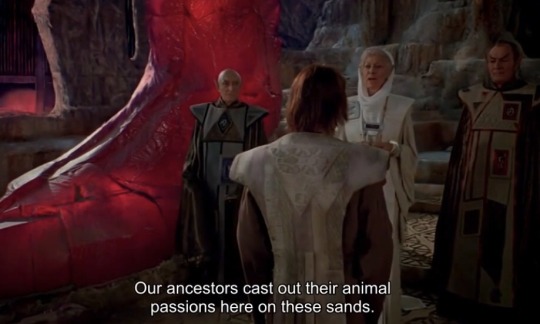
[id: photo of Spock standing before the masters of kolinahr, with subtitles reading “Our ancestors cast out their animal passions here on these sands.”]
Ah yes, attempting to cast out my “animal passions” that society has taught me to be ashamed of for my friend/brother/lover, before ultimately realizing that the feelings we share are what give life purpose, and that I can only be fulfilled if I am my genuine self. This totally isn’t a metaphor for anything at all.
#TMP is the one where spock goes to conversion therapy 💀#the fact that this is going on at the exact moment spock is saying goodbye to Jim#star trek tos#star trek#spirk#k/s#kirk/spock#s’chn t’gai spock#the premise#tos#james t kirk#space husbands#t’hy’la#star trek the motion picture#star trek: the motion picture#star trek tmp#my post#queer coding#k/s is canon tag
124 notes
·
View notes
Text
kolinahr masters when spock son of sarek shows up to purge his emotions about a certain starfleet captain recently promoted to admiral:
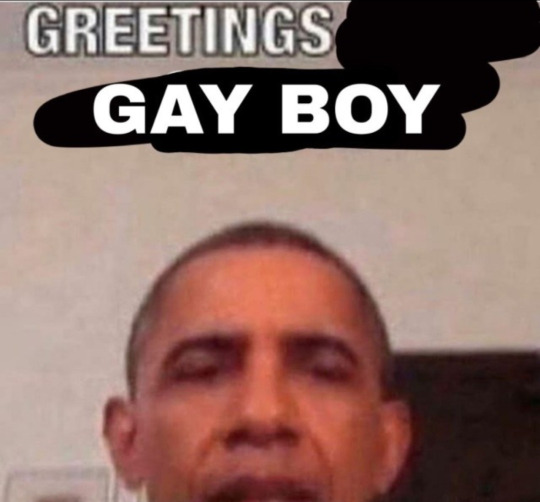
419 notes
·
View notes
Text
Speaking of gay shame, there’s a lot of it in the TMP novelization... I think Spock uses the word “shame” three times or more in the few pages when he’s supposed to be finishing the Kolinahr and instead finds himself thinking of Jim Kirk and even hearing his thoughts. (Those thoughts: “Spock, I wish you were here.”)
My favorite of these is when Spock has to let the lead priest-lady look into his mind: “Spock could not refuse the High Master T’sai, not even at this moment of shame. As she touched him, Spock let his mind open, in the giving and receiving of mindmeld Oneness. Kaiidth! What was there was there, and it was T’sai’s right to learn the complete truth of it.” Poor Spock —it’s hard to become a certified Ex-Gay on a planet full of telepaths.
Then there’s the part where he finally meets Kirk again and experiences “physiological changes” which are “so shocking that they made him scorn himself.” (whatever that means)
Finally, the word “shame” comes up some more in the “this simple feeling” scene, but this time in the form of a negation:
“Spock laughed again. Then he saw Kirk’s face. He reached out weakly and found Kirk’s arm, then his hand, and took a startled Kirk’s hand in his own.
‘Jim,’ Spock said.
McCoy looked in astonishment at the visible and unashamed emotion on Spock’s face as he clutched Kirk’s hand.
Kirk returned the pressure and brought his other hand to cover Spock’s, holding it between both of his, signaling Spock that there was no shame in either giving or in answering fully.”
61 notes
·
View notes